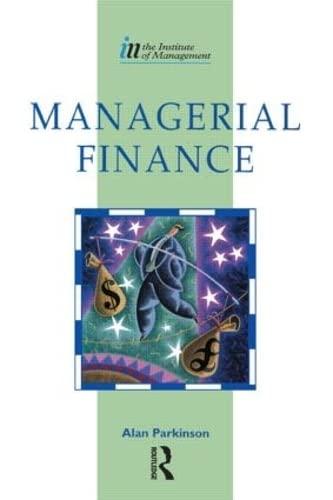Question
Smith Company Balance Sheet and selected Income Statement data Assets: Cash and marketable securities $300,000 Accounts receivable 2,215,000 Inventories 1,837,500 Prepaid expenses 24,000 Total current
Smith Company Balance Sheet and selected Income Statement data
Assets:
Cash and marketable securities $300,000
Accounts receivable 2,215,000
Inventories 1,837,500
Prepaid expenses 24,000
Total current assets $3,286,500
Fixed assets 2,700,000
Less: accumulated depreciation 1,087,500
Net fixed assets $1,612,500
Total assets $4,899,000
Liabilities:
Accounts payable $240,000
Notes payable 825,000
Accrued taxes 42,500
Total current liabilities $1,107,000
Long-term debt 975,000
Owner's equity 2,817,000
Total liabilities and owner's equity $4,899,000
Net sales (all credit) $6,375,000
Less: Cost of goods sold 4,312,500
Selling and administrative expense 1,387,500
Depreciation expense 135,000
Interest expense 127,000
Earnings before taxes $412,500
Income taxes 225,000
Net income $187,500
Common stock dividends $97,500
Change in retained earnings $90,000
Based on the above, calculate the following ratios: current ratio, average collection period, debt ratio, net profit margin and inventory turnover. ( 5 marks)
Your bank has agreed to loan you $3,000 if you agree to pay a lump sum of $5,775 in five years. What annual rate of interest will you be paying? ( 2 marks)
Earnings per share for XYZ, Inc. grew constantly from $7.99 in 1974 to $12.68 in 1980. What was the compound annual growth rate in earnings-per-share over the period? ( 2 marks)
a.) If Sparco, Inc. deposits $150 at the end of each year for the next eight years in an account that pays 5% interest, how much money will Sparco have at the end of eight years? (2 marks)
b.) Suppose Sparco decides that they need to have $5,300 at the end of the eight years. How much will they have to deposit at the end of each year? (2 marks)
What is the present value of the following perpetuities? (4 marks)
a. $600 discounted at 7%
b. $450 discounted at 12%
c. $1,000 discounted at 6%
d. $880 discounted at 9%
If you deposit $1,000 each year in a savings account earning 4%, compounded annually, how much will you have in 10 years? (2 marks)
Your bank has agreed to loan you $3,000 if you agree to pay a lump sum of $5,775 in five years. What annual rate of interest will you be paying? (2 marks)
If you invest $450 today and it increases to $6,185 at the end of 20 years, what rate of return have you earned? ( 2 marks)
You are planning to deposit $10,000 today into a bank account. Five years from today you expect to withdraw $7,500. If the account pays 5% interest per year, how much will remain in the account eight years from today? Round to the nearest dollar (3 marks)
An investment will pay $500 in three years, $700 in five years, and $1,000 in nine years. If the opportunity rate is 6%, what is the present value of this investment? (3 marks)
In order to send your oldest child to law school when the time comes, you want to accumulate $40,000 at the end of 18 years. Assuming that your savings account will pay 6% compounded annually, how much would you have to deposit if:
a. you want to deposit an amount annually at the end of each year? ( 1mark)
Step by Step Solution
There are 3 Steps involved in it
Step: 1

Get Instant Access to Expert-Tailored Solutions
See step-by-step solutions with expert insights and AI powered tools for academic success
Step: 2

Step: 3

Ace Your Homework with AI
Get the answers you need in no time with our AI-driven, step-by-step assistance
Get Started


